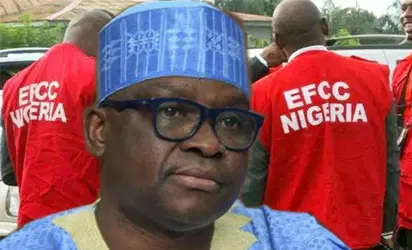Federal High Court in Lagos on Wednesday acquitted former Ekiti State Governor Ayodele Fayose of all money laundering charges brought against him by the Economic and Financial Crimes Commission (EFCC). The high-profile case, which has lingered in the public domain for years, has finally come to a dramatic close as the court ruled in Fayose’s favor.
Presiding over the matter, Justice Chukwujekwu Aneke upheld Fayose’s no-case submission, declaring that the EFCC had failed to present credible and sufficient evidence to establish a prima facie case. The ruling means Fayose was under no obligation to enter a defense, as the prosecution could not meet the legal threshold required to proceed to trial.
Fayose had been accused of laundering substantial sums of public funds during his tenure as governor, a case that sparked national outrage and stirred debates about corruption in public office. The EFCC had alleged financial misconduct and abuse of office, claims Fayose consistently denied throughout the legal proceedings.
Read also:
- EFCC secures conviction of 30 internet fraudsters in Ibadan
- EFCC Boss: Politicians, fraudsters hiding Billions in Cryptocurrency to evade anti-corruption probes
- CBN 2024 financial performance an indicator Cardoso’s twerking yielding results
The judgment comes as a major victory for Fayose, who maintained his innocence from the onset. It also represents a significant setback for the EFCC, whose failure to secure a conviction in such a high-profile case raises questions about the agency’s investigative processes and prosecutorial strength.
Fayose’s legal team welcomed the decision, calling it a triumph of justice and a reaffirmation of the principle that accusations must be backed by solid evidence, not media trials or political vendettas. With this ruling, Fayose walks free, legally vindicated after years of intense scrutiny and courtroom drama.
The former governor’s acquittal is already generating widespread reactions across political and legal circles, with analysts suggesting the verdict could influence similar pending cases involving former public officials. As Nigeria continues its anti-corruption crusade, this judgment is expected to spark fresh conversations about the effectiveness of the fight against graft and the credibility of the nation’s justice system.
